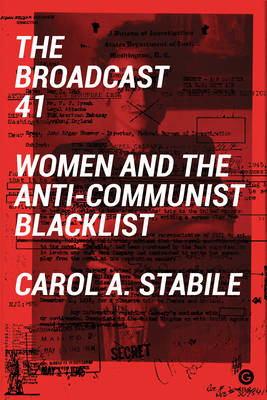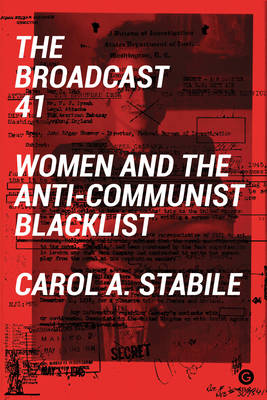
- Afhalen na 1 uur in een winkel met voorraad
- Gratis thuislevering in België vanaf € 30
- Ruim aanbod met 7 miljoen producten
- Afhalen na 1 uur in een winkel met voorraad
- Gratis thuislevering in België vanaf € 30
- Ruim aanbod met 7 miljoen producten
Zoeken
Omschrijving
How forty-one women--including Dorothy Parker, Gypsy Rose Lee, and Lena Horne--were forced out of American television and radio in the 1950s "Red Scare."
At the dawn of the Cold War era, forty-one women working in American radio and television were placed on a media blacklist and forced from their industry. The ostensible reason: so-called Communist influence. But in truth these women--among them Dorothy Parker, Lena Horne, and Gypsy Rose Lee--were, by nature of their diversity and ambition, a threat to the traditional portrayal of the American family on the airwaves. This book from Goldsmiths Press describes what American radio and television lost when these women were blacklisted, documenting their aspirations and achievements.
Through original archival research and access to FBI blacklist documents, The Broadcast 41 details the blacklisted women's attempts in the 1930s and 1940s to depict America as diverse, complicated, and inclusive. The book tells a story about what happens when non-male, non-white perspectives are excluded from media industries, and it imagines what the new medium of television might have looked like had dissenting viewpoints not been eliminated at such a formative moment. The all-white, male-dominated Leave it to Beaver America about which conservative politicians wax nostalgic existed largely because of the forcible silencing of these forty-one women and others like them. For anyone concerned with the ways in which our cultural narrative is constructed, this book offers an urgent reminder of the myths we perpetuate when a select few dominate the airwaves.Specificaties
Betrokkenen
- Auteur(s):
- Uitgeverij:
Inhoud
- Aantal bladzijden:
- 320
- Taal:
- Engels
- Reeks:
Eigenschappen
- Productcode (EAN):
- 9781912685424
- Verschijningsdatum:
- 25/02/2020
- Uitvoering:
- Paperback
- Formaat:
- Trade paperback (VS)
- Afmetingen:
- 142 mm x 221 mm
- Gewicht:
- 385 g

Alleen bij Standaard Boekhandel
+ 47 punten op je klantenkaart van Standaard Boekhandel
Beoordelingen
We publiceren alleen reviews die voldoen aan de voorwaarden voor reviews. Bekijk onze voorwaarden voor reviews.











